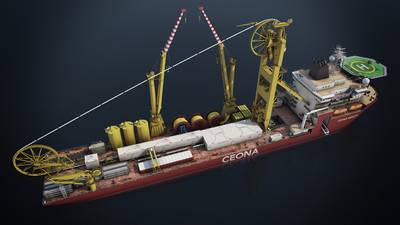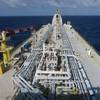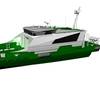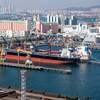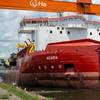Great Ships of 2014: Ceona Amazon
Dramatic changes to the global oil and gas landscape over the last decade have led the industry to encounter increasingly challenging and remote environments including emerging yet largely unexplored new provinces and more complex deepwater territories.
But true to its industrious and adventurous spirit, the sector is turning these challenges into opportunities and underpinning this shift to new frontiers is adding significant tangible value to the way in which hydrocarbons are recovered.
It is not only enabling the industry to unlock reserves and ensure security of supplies but increasingly improving efficiency and reducing costs by applying more effective methods that both mitigate risk and optimise production. The recent drop of oil barrel value has made cost reduction crucial.
With a large product carrying capacity and the ability to tackle multiple pipelay workscopes and perform heavy construction in one trip, The Ceona Amazon is a multi-function construction vessel designed to support the energy industry in the most logistically challenging deepwater field developments at optimised costs.
Built at Crist yard in Poland and outfitted at Lloyd Werft yard in Bremerhaven, Germany, The Amazon is Ceona’s flagship vessel.
Conceived in house and fully owned by the company, The Amazon represents the next generation of the company’s fleet. Ceona is a subsea umbilicals, risers and flowlines (SURF) contractor with heavy subsea construction capabilities and a growing geographical footprint, particularly in West Africa, the Gulf of Mexico and Brazil.
The Ceona Amazon includes a combination of capacities, such as spool base independent pipelay, heavy lift (two 400t cranes working in tandem) and subsea construction (including floaters installation) with the vessel designed to be weather resilient and technically versatile.
At 199-m in length, the ship is able to offer one-stop-shop offshore trips for clients’ projects. It boasts a huge product carrying capacity (5,000t of flexible or 8,500t of rigid pipe stored on and below her 4,600 sw. m. deck), twin 400-ton heave compensated (AHC) mast head cranes capable of working in tandem lifting mode, innovative on-vessel pipeline fabrication capabilities (welding, non-destructive testing and FJC) and superior operability (drill ship design hull with mid-ship moonpool) – each feature positioning
The ship is due to be fully operational early in 2015 following the final installation of a 570-ton pipelay tower and the cranes at Huisman yard in Schiedam, the Netherlands, where the Ceona Amazon will become fully fledged as a uniquely versatile subsea construction vessel.
The pipelay system consists of a tower with a top tension of 570-ton. It can lay rigid, flexible pipelines and umbilicals, risers and install large subsea structures using one or both of its cranes in tandem lift mode.
Ceona Amazon has an innovative configured G-lay pipelay system (under patent application) which combines components of well-known tried and tested pipelay systems (J-S and Reel-lay).
The welding line is traditional S-lay, however once welded, the pipe is deflected around a stern wheel and installed through a conventional pipelay tower with two tensioners and a total top tension of 570t in deep water.
There is also space left on the large back deck to hold a vast complement of project specific equipment such as suction anchors, this is complemented with sizeable under-deck storage. The vessel’s huge capacity avoids the requirement to call for the support of an offshore supply barge as well as allowing for faster pipelay capabilities.
The combination of the mast cranes capable of operating in tandem supports the lowering of large structures to water depths of 3000m to install FPSOs, Semis or TLPs and alleviates the need for a second vessel, as is common for such operations.
In addition, due to the tandem crane arrangements, very long and complex spools are easily managed. The AHC cranes will be accompanied by a single 30t heave compensated knuckle boom crane.
Based on a drill ship hull, the mid-ship moonpool allows operations to continue in tougher sea and wind conditions than her peers. The pipelay tower is placed as close to the transverse axes of the vessel as possible to minimise the effect of vessel motions on the pipe installation stresses. At 8m by 13.5m the moonpool is large enough for the biggest PLETs.
Through her versatility, heavy lift capabilities and large storage capacity, the Ceona Amazon is a unique vessel that offers considerable added value to the energy industry as it enters increasingly challenging deepwater territories.
(As published in the December 2014 edition of Maritime Reporter & Engineering News - http://magazines.marinelink.com/Magazines/MaritimeReporter)



